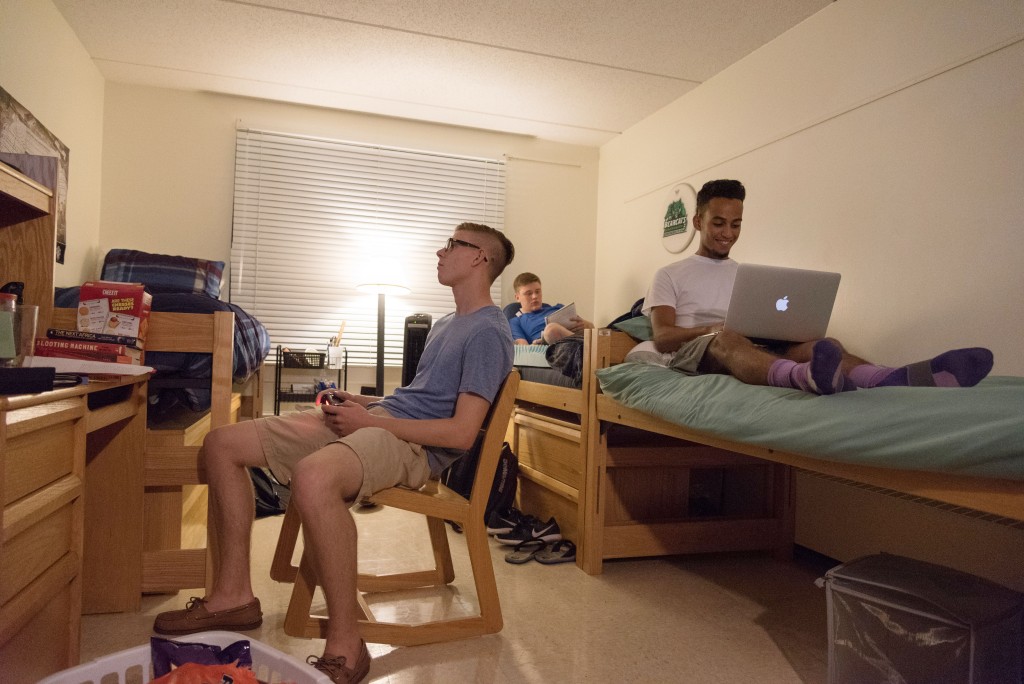
On their first day of classes, freshmen Tristan Votta, Quentin Hardy and Kevin Wu got ready by maneuvering around a Cayuga double room packed with a bunk bed, a regular bed, three wardrobes and only two desks.
Approximately 300 freshman were assigned to Super Occupancy Housing (SOH) — commonly referred to as a “forced triple” — this semester, which places three students in a room meant for two.
“I was pretty bummed out because during orientation when we had two people, I thought the rooms were kind of small already, so I didn’t know how we were going to fit three people into a double,” said Wu, an undeclared freshman.
Paola Mignone, the associate director of business affairs for Residential Life, wrote in an email that SOH was created to accommodate an increase in demand for on-campus housing.
“Binghamton University experienced an unprecedented increase in the number of students who want to live on our campus,” Mignone wrote. “For this reason, renovations to Cayuga Hall were postponed for one year in order to meet the increased demand for on-campus housing.”
Mignone said that more freshman enrolled this year than expected and an abnormal amount of returning students also signed up for on-campus housing. Students were picked for SOH if they applied late or after the deadline for housing applications, but this was not the first year students were forced to live in SOH.
“The housing cancellation deadline for this year was extended from March 10th to June 10th due to the demand for on-campus housing,” she wrote. “We anticipate a March deadline as well for [2016-2017] as a March deadline helps us better project how many spaces will be available for the incoming students.”
Nikki Caruso, an undeclared freshman, was put in SOH in Cayuga. She said the cramped quarters were disappointing.
“It’s just frustrating because I have no space,” Caruso said. “There’s only two desks and I happened to be the one that didn’t get the desk so I have a little corner of my room that’s beside my bed. I brought all this stuff for a desk that I don’t have.”
To ensure the process was fair, SOH roommates picked a color before moving in that corresponded to a certain set of furniture. Jamie Hong, an undeclared freshman, said that she thinks her third roommate chose to move to a double room in Hinman within the first three hours of move-in because she would not be getting a desk.
“Now that she’s moved out, I feel relieved,” Hong said. “The way it worked was that the top bunk got a desk and the people on the floor were supposed to share a desk and I was stressed about that. I really don’t think it’s practical to share desks.”
Hong and her roommate Kylie McClay, an undeclared freshman, both picked College-in-the-Woods as their preferred living community and wished to stay there despite openings in Hinman that were offered to them.
“We both got [the email], but I got it two days before school started,” McClay said. “I didn’t know if I wanted to deal with moving communities then.”
Residential Life began moving freshmen living in SOH into already-empty beds in non-SOH housing in Hinman, and now only 100 students remain in SOH. The rest are hoping to be moved out by the end of the semester to either empty beds or off-campus housing. Students in SOH are being billed for a standard double, but they are being given a credit that reduces rates from $7 to $9 dollars per night that they are living in SOH. Depending on how much time a student is spending in SOH, these rates will vary.
Residential Life declined to comment on how the University will make up for the fewer beds remaining when Cayuga is closed for renovation next year until housing decisions are more definite.


